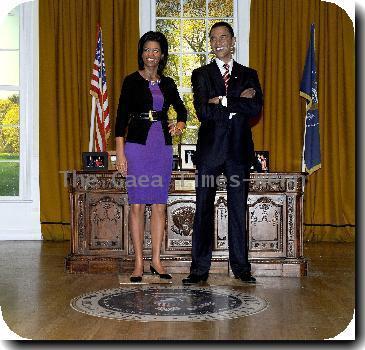With security key to rebuilding, authorities struggle for control of Haiti’s capital
By Jonathan M. Katz, APSunday, April 11, 2010
Haiti’s police struggle to control ravaged capital
PORT-AU-PRINCE, Haiti — A police inspector taunted the gangster they call “Obama” through the bars of a downtown lockup. Stuffed into a tiny cell with nine other men, the 23-year-old inmate looked panicked, exhausted and freshly beaten.
It’s guys like this, the pudgy cop said, who threaten to upend Port-au-Prince three months after the earthquake, exploiting the continuing chaos to commit murder, assaults and kidnappings just as the international community arrives with billions of dollars to rebuild the ravaged capital.
Fears of such insecurity have prompted the U.S. government to invest millions in stabilization and security to protect its post-quake development programs. More than $422 million of U.S. aid has come from the Defense Department.
The United States is expanding a pre-quake anti-crime effort — which focused on building infrastructure, community ties and police controls in what was the city’s most dangerous slum, Cite Soleil — to the new hotspot of Martissant, on the western periphery of the capital.
Now with some $35 million in funding, the Haiti Stabilization Initiative was established to rebuild communities where extreme poverty and desperation, both exacerbated by the Jan. 12 disaster, provide fertile ground for gangs. Its first phase in Martissant involves a flood-control project employing nearly 700 residents, paying them $4.60 a day for six days a week of work.
“What happens in the urban hotspots in Haiti affects (the United States),” said Laurence Jones, deputy coordinator of the U.S.-run program. “We have an interest in a stable, prosperous and democratic Haiti.”
The United Nations’ Community Violence Reduction program — a broader-based outgrowth of its effort to disarm gangs following the 2004 rebellion and ouster of President Jean-Bertrand Aristide — is also focused on Martissant.
“Martissant is huge. Every area has its own gang affiliation, and they are all heavily armed,” said Port-au-Prince police commissioner Michel-Ange Gedeon.
People in the slums say they are grateful for efforts to combat the violence, including stepped-up patrols by Haiti’s expanding National Police Force. On Friday, a team of 14 heavily armed officers charged over rubble piles and cracked pavement through a warren in Martissant’s Saint-Bernadette section looking for illegal weapons and the targets of outstanding warrants.
“If there are more police here, maybe food will follow,” said Johnny Saint-Fort, an unemployed 41-year-old mason.
But with poverty this entrenched — in urban areas this cramped — the crime problem is likely to remain daunting.
Residents complain that gang shootouts are on the increase since the earthquake, and local media have reported a steady uptick in gunshot wounds in Martissant. Aid workers say armed gang members have shown up at their meetings.
As crime spills over to touch the wealthy and elite — at least three foreigners have been kidnapped in recent weeks — security is taking on an even more central role in the rebuilding effort.
That concerns some non-governmental aid groups who worry that too much of the money meant for Haiti’s reconstruction will be spent on anti-crime measures, specifically the hiring of private security firms.
About a dozen groups wrote a letter to U.S. Secretary of State Hillary Rodham Clinton ahead of the March 31 Haiti U.N. donors conference to urge that funds not go to contractors such as Virginia-based DynCorp, which prior to the quake built a Cite Soleil police headquarters with $1 million from the Haiti Stabilization Initiative.
It’s too soon to say how much will be spent on security now. The United Nations is still crunching numbers from the conference, which raised a preliminary $9.9 billion for Haiti. The State Department has not released a breakdown of the $1.15 billion pledged by President Barack Obama’s administration but not yet approved by Congress.
In the meantime, maintaining law and order falls mostly to local police and security forces, who are increasingly taking on a larger role in a country where crime fighting has been entirely the province of some 9,000 U.N. peacekeepers since 2004.
Essentially out of the picture are U.S. troops, who numbered as many as 20,000 in the weeks after the earthquake but have reduced their presence to a rump logistical force and are now rarely seen around the capital.
Even as local police work to improve their public image by stepping up patrols and community recruiting, suspicion of corruption and collusion abounds. An investigation is under way into how 4,300 prisoners — some hardened criminals — escaped the overcrowded and dangerous national penitentiary during the quake.
“You know, I don’t want to anticipate the result of the investigation, but to me it’s very suspicious,” national police chief Mario Andersol said.
There have been some successes: Haitian police were the ones who captured the 23-year-old who took the U.S. president’s name as a power-signifying nom de guerre. “Obama,” born Fenel Mesieus, was recognized by an officer responding to a traffic accident in another part of Port-au-Prince.
Police accuse him of commanding a gang of 1,000 members, masterminding kidnappings and the murder of two off-duty police officers. Now he’s cramped in a cell sweating through his undershirt, pants falling around his skinny hips, fresh cuts on his arm and a broken nose.
Mesieus denied the charges, which only made the inspector laugh harder. The prisoner’s eyes hardened into a cutting glare before he lowered himself into a cramped corner of the cell. He’s been in this position before, having served time in the national penitentiary until a judge ordered his release last year.
Asked if inmates who escaped from the prison were responsible for the mayhem, the taciturn young man shook his head.
“Port-au-Prince was always insecure,” Mesieus said.
Tags: Barack Obama, Caribbean, Correctional Systems, Haiti, Latin America And Caribbean, Law Enforcement, Neighborhoods, North America, Police, Residential Real Estate, United States, Violent Crime

